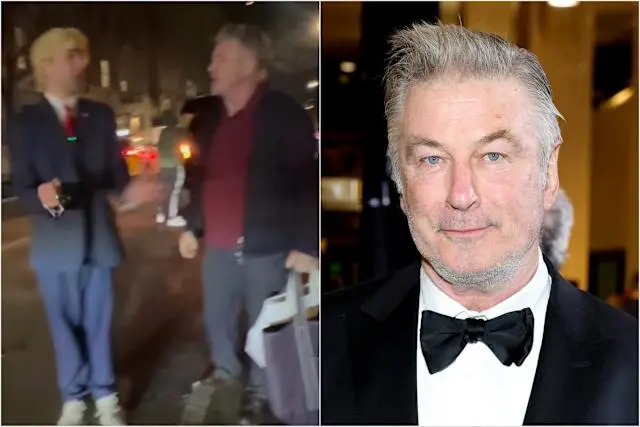The recent encounter between Donald Trump impersonator Jason Scoop and Alec Baldwin has taken the internet by storm, particularly with Scoop’s allegations concerning Hilaria Baldwin. Following a heated confrontation outside Alec Baldwin’s residence, in which Alec issued a stern warning to Scoop, the comedian provided a wild account of how Hilaria chased him down the street once the cameras were off. This unexpected twist has drawn attention to the Baldwin family controversy, and the world of celebrity gossip is buzzing.
The exchange began when Scoop, known for his comedy sketches and audience heckling, approached Alec as he was unloading his SUV in New York City. With the backdrop of Alec’s high-profile tragedy during the filming of “Rust,” tensions ran high. Scoop’s comments on the incident, including his impersonation of Trump and the ensuing threat from Alec, highlight both the absurdity and seriousness of celebrity encounters.
The Encounter: A Breakdown of Events
The situation escalated quickly on the fateful night. Jason Scoop approached Alec Baldwin under the guise of humor—approaching the actor with jokes about offering a “total pardon” for the tragic incident on the set of “Rust.” As Alec attempted to maintain his composure, the tension in the air became palpable, leading to an explosive confrontation where Alec warned Scoop that he could snap his neck. The circumstances were not just awkward but also put a spotlight on the mental strain resulting from the Baldwin family’s struggles with the fallout of the incident.

The Role of Hilaria Baldwin
Adding to the drama, Scoop claimed that once the cameras stopped rolling, Hilaria Baldwin pursued him. His recounting, laced with his trademark humor, suggested that she was chasing after him in high heels, trying to reclaim his phone. His description of her reaction as that of the “cucumber lady” plays into the long-standing discussions around Hilaria’s image and public perception. Her attempts to intervene in a situation that escalated from a comedic burst to a serious warning from Alec has set social media abuzz with Hilaria Baldwin news.
The Aftermath of the Confrontation
In the aftermath of Scoop’s clash with Alec, he expressed both excitement and fear. While he had successfully garnered attention through this publicity stunt, the reality that a confrontation with a “scary man” could turn violent lingered in his mind. The comedian’s tales of the altercation—specifically his dash down the street away from Hilaria—illustrate the chaotic nature of celebrity encounters.
As the story spread, audience reactions varied widely. Some praised Scoop for his comedic bravery, while others criticized him for crossing the line into inappropriate territory, especially given the context surrounding Alec’s past. The balance of comedy and responsibility in celebrity impersonation comes under scrutiny here—a discussion that is increasingly relevant in the landscape of modern humor.
Public Reactions and Celebrity Gossips
Social media has reacted in waves, with celebrity gossip flooding timelines. Clips of the encounter went viral, showing Scoop in full character mode, taunting Alec about the “Rust” incident and his supposed impending pardon. Fans and critics alike took to various platforms to share their thoughts. The blending of comedy and tragedy has never been as pronounced as it is in Scoop’s act. In a world that often teeters between political satire and personal crisis, this incident encapsulates a crucial moment in current pop culture commentary.
The Impersonator’s Perspective
Post-incident, Scoop remained unapologetic about his antics. He insisted that his role as a Donald Trump impersonator requires him to push boundaries. Yet, it begs the question: where does one draw the line in the pursuit of comedy? Many argue that the context of Alec Baldwin’s situation should have led to a more respectful engagement. However, the absurd and often dark nature of Trump satire leaves room for debate on the appropriateness of certain comedic approaches.
The Baldwin Family and Controversy
The Baldwin family’s reputation has been under scrutiny for quite some time, particularly with the controversy surrounding the tragic shooting of Halyna Hutchins. With each new detail surfacing, it becomes clear that the interactions between members of this prominent family and outsiders are layered with tension. Alec’s position as a father and his history of struggling with mental health post-trauma adds another layer to the celebrity ripple effect of this incident.
Hilaria’s Public Image and the Struggles of Celebrity Life

In the aftermath of the confrontation, Hilaria Baldwin was thrust back into the public eye. Previously, she faced significant backlash regarding her heritage claims and the infamous ‘cucumber’ incident. The public’s ongoing scrutiny often complicates the lives of celebrities, especially when they try to manage personal crises alongside public relations disasters. Coining the term “cucumber lady” provides an insight into how public perception can sharply define a celebrity’s identity.
The Impact of Social Media in Modern Celebrity Culture
The evolution of how celebrities deal with public scrutiny relies heavily on social media platforms. Hilaria’s non-response to comments following the incident highlights a strategy some public figures adopt—silencing the noise, though not always without consequences. The way audiences perceive and engage with celebrity activities today shapes narratives far beyond any traditional media outlet.
Reflections on Celebrity Gossip and Impersonation
The incident brings into focus a broader discussion of celebrity impersonation and public interest. As audiences become more invested in the lives of public figures, interactions like that of Scoop and Baldwin occur under the weight of expectation for entertainment. Pressure mounts on comedians to produce #viral moments, sometimes leading to unforeseen consequences. This incident underscores the difficulties in navigating humor amid real-world consequences and health crises.
The Bigger Picture: Comedy, Tragedy, and the Public Eye
The emotional aftermath of the confrontation extends beyond mere entertainment. The intersection of humor and tragedy in celebrity interactions is a compelling, if contentious, topic. Finding humor in dark times has been a coping mechanism for many; however, it’s essential to discern what is deemed acceptable. The balancing act of comedy amidst serious subject matters, like the fallout from the Baldwin family’s tragedy, raises ethical considerations for public figures and comedians alike.
The Evolution of Audience Engagement in Comedy
As audience participation shifts—the expectations for comedians become increasingly intertwined with social issues. The reality is that public exposure to the ups and downs of celebrity life helps audiences connect, sometimes even pushing comedians to take unexpected risks. This reshapes the narrative of what is deemed humorous, with celebrities often becoming fodder for jokes based on their real-life struggles. Scoop’s parody of a serious narrative certainly encapsulates that shift.
Final Thoughts on the Incident
The chase that Jason Scoop alleges Hilaria Baldwin made has turned a seemingly simple confrontation into a topic of heated debate regarding the nature of comedy and its implications in our society. The question remains how far one should push boundaries for comedic effect, particularly when public figures’ personal tragedies are in play. Engaging in humor while respecting the sensitivities of real-life situations is a challenge, and navigating those waters will only become more complex as society evolves.
| Element | Description |
|---|---|
| Donald Trump impersonator | A comedian portraying Donald Trump to evoke humor. |
| Alec Baldwin warning | A serious confrontation between Scoop and Alec about boundaries. |
| Hilaria Baldwin news | The ongoing spotlight on Hilaria’s public persona and private challenges. |
| Audience heckling | Engaging spectators in comedic acts, sometimes crossing lines. |
The evolving nature of celebrity culture has shifted the dynamics of how public figures engage with comedy, gossip, and tragedy. Whether through attention-grabbing antics or serious warnings, the interplay of humor and real issues continues to redefine modern entertainment.
Hi, I’m Sarah, a 30-year-old journalist with a passion for storytelling and uncovering the truth. I strive to bring important issues to light and connect with my audience through compelling narratives.



